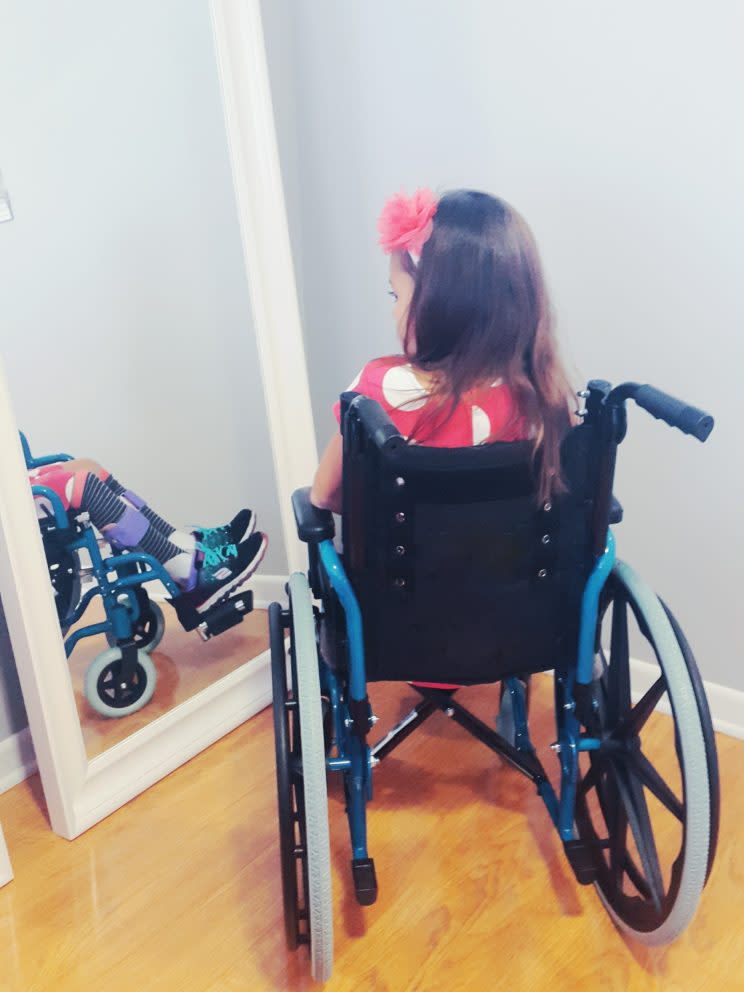‘You Are Beautiful,’ I Tell My Daughter, 8, Who Has a Physical Disability. I Hope She Knows It's True.

My daughter looks absolutely nothing like me, and it was the first thing I noticed the morning she was born.
While I have eyes so blue that people often ask me if they are real, hers were such a deep shade of brown that even in the brightest of lights I couldn’t see where her pupils started and her irises ended. And her skin, a rich olive color that showed true the Native American bloodline of her birth father, was a trait that only intensified my Irish complexion — a shade so pale I often joke that it’s called “clear.”
Although I may have been biased, and have always thought my daughter beautiful, inside and out, plenty of others agreed: She was signed to her first modeling agency at the tender age of 11 months, and strangers would often walk up to her in public to exclaim, “What a gorgeous girl,” before adding, “and she looks absolutely nothing like you.” Not sure if I should be flattered or offended — I typically just found myself nodding in agreement.
I had never imagined having a child who looks so different from me. But I also had never pictured having one who looks so different from everyone else: with an obvious physical disability.
At just a year old, she was diagnosed with a rare form of Ehlers-Danlos syndrome, a connective tissue disorder that affects everything from her joints and organs to the way she regulates her body temperature. She got her first pair of leg braces at age 2 — the same year she was placed in a prestigious booking spot by her agency, incidentally — and she now uses a wheelchair when she needs to walk longer distances. So although her face is still as beautiful as ever, it doesn’t seem to matter to many, because her disability is what people tend to see first.
Which now, at 8 years old, is starting to upset her.
After spending half an hour in the morning picking out just the right headband to match the school outfit that took her 45 minutes to pick out the night before, she typically begins to cry. “I don’t want to wear these braces to school,” she’ll say, tears welling up in her eyes. “No one will want to be my friend, and no one will want to sit with me at lunch because they will think I look ugly.” And as her mother, my heart breaks, because I know how hurt she is feeling inside, and no matter how much I’d like to fix this for her, I can’t.
But it doesn’t stop me from trying. “You are beautiful,” I tell her. “And if other people can’t see your beauty in all the ways that matter, then you probably don’t want to be friends with them anyway. You have a beautiful face, but that is not nearly as important as your beautiful heart. You are kind, caring, and you always try to be a good friend. If people are acting ugly toward you, then they are the ones who need to be looking in the mirror.”
I pray with all my heart that she believes me, because it’s the truth that I speak. I’ve never liked the phrase “Beauty is only skin deep,” because if you ask me, beauty goes deeper.
Beautiful people are the ones who put a smile on my daughter’s face when they look past the plastic strapped onto her legs, and beauty is the caring friends who go out of their way to make her feel included. Beauty is in the heart of the teacher who makes the extra effort to compliment my daughter’s clothes, and beauty is in the parents who teach their kids to be kind.
I sometimes ask her what it means to be beautiful. “It means that other people like to look at you,” she says. And then I ask, “Does it make you smile more to look at people who treat you kindly, or when you look at people who make you feel sad?”
She tells me what I already knew she was going to say: “I smile more when I look at people who make me feel good, because I don’t like looking at the people who hurt me.”
And then she takes it a step further, noting, “When I make people smile, it means that I’m showing them my pretty heart.”
I hope that means she understands.
Because although she has a face that has, despite her self-doubts, been deemed worthy enough that companies pay to use her image, I refuse to teach her that beauty lies in our skin, so I don’t even mention that. Especially since I put an end to that story.
My daughter had a good run with her modeling agency, and at the height of her short little life career, I fought to get her out of the contract and canceled her status with the agency. Back then I had no idea that the progression of my daughter’s disorder would lead to her using a wheelchair at 8 years old, but what I did realize was that I didn’t like what the experience was teaching her: I didn’t like that when everyone around her placed so much emphasis on her beauty, that they were only talking about her face.
Related:
I Write Letters to My 8-Year-Old So I Can Reach Her When She’s Grown
‘I Went Back to Him, to the Home I Feared I Might Die In’
Let’s keep in touch! Follow Yahoo Beauty on Facebook, Twitter, Instagram, and Pinterest.
